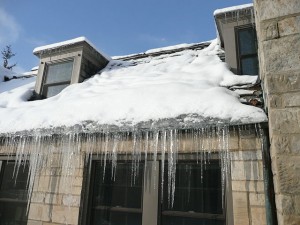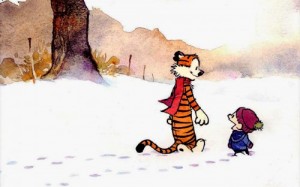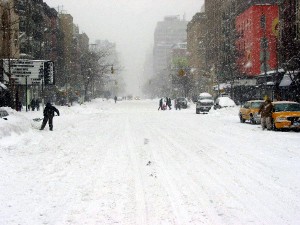 Mrs. T is under the weather, and noticeably the worse for it. No sooner did we return from Florida than she was assaulted by a virulent, vaccine-resistant strain of flu that laid her low enough to put her in the hospital for a couple of days. That’s the reason why we’re holed up together in deepest Connecticut, where I can nurse her more comfortably as the two of us listen to the half-ominous, half-hopeful background plops and drips of the melting clumps of ice and snow that slide off the roof of our farmhouse at increasingly frequent intervals.
Mrs. T is under the weather, and noticeably the worse for it. No sooner did we return from Florida than she was assaulted by a virulent, vaccine-resistant strain of flu that laid her low enough to put her in the hospital for a couple of days. That’s the reason why we’re holed up together in deepest Connecticut, where I can nurse her more comfortably as the two of us listen to the half-ominous, half-hopeful background plops and drips of the melting clumps of ice and snow that slide off the roof of our farmhouse at increasingly frequent intervals.
This has been the hardest winter by far that I’ve ever seen. We were able to escape the worst of it by going to Florida at the end of December and (mostly) staying there. Still, I got a delayed taste of its horrors last week, for not only was I forced to slog through filthy, ankle-deep slush in order to see three shows on Broadway, but I also contrived to spend two nerve-racking hours driving through a medium-sized blizzard on Tuesday en route to Show No. 1. So I can honestly say that I survived some of the dreadful winter of 2015—and that I didn’t like it one little bit.
 Now that I’ve attained the dignified age of fifty-nine, I find it all but impossible to remember how it felt to long each year for snow. We didn’t get very much of it when I was growing up in Smalltown, U.S.A. The word “snow” appears no more than a half-dozen times in the memoir of my childhood and youth that I wrote not long after moving to New York, and only one of those appearances is obviously nostalgic. It’s the passage in which I describe the family gatherings that took place at my grandmother’s house each Christmas Eve:
Now that I’ve attained the dignified age of fifty-nine, I find it all but impossible to remember how it felt to long each year for snow. We didn’t get very much of it when I was growing up in Smalltown, U.S.A. The word “snow” appears no more than a half-dozen times in the memoir of my childhood and youth that I wrote not long after moving to New York, and only one of those appearances is obviously nostalgic. It’s the passage in which I describe the family gatherings that took place at my grandmother’s house each Christmas Eve:
Though I liked to play with my cousins, I also liked to be alone, and when I grew tired of running around the house, I would trudge across the snow-covered dirt road to Dot and Marshall’s house and watch a little Christmas Eve television by myself. One year I watched Gian Carlo Menotti’s Amahl and the Night Visitors, my first opera, and cried when the crippled shepherd boy offered his crutch to the Three Kings to give to the Holy Child; one year I watched the astronauts of Apollo 8, in orbit around the moon, open a Bible and read the Christmas story aloud to the whole world. I went out in the front yard afterward and stood in the ankle-high snow, looking for a long time at the silvery wedge that hung so far above me in the starry winter sky. Then I crossed the road again to eat warmed-over turkey and dressing with the rest of the family.
It was in part because of their rareness that I treasured the days when enough snow fell on Smalltown that my brother and I could stay home from school and play in it. My parents, bless them, had the goodness not to tell us that such days were pleasurable only to children. How sad it would have been to know too soon that a time was to come when I would go to considerable trouble to flee them.
 The last time I genuinely enjoyed a blizzard was in 2003, for it came on a Sunday when I didn’t have to go anywhere or do anything, and I was able to revel in the mysterious delights of strolling through the near-empty streets of Manhattan, marveling at the muffled buzz of a city covered with undefiled white snow. Save for that fleeting, far-off interlude, the coming of adulthood has otherwise deprived me of my innocent ability to revel in a really good blizzard. Now I look upon snow with a mixture of abject fear and anxious respect, and eagerly await its magical vanishing come spring.
The last time I genuinely enjoyed a blizzard was in 2003, for it came on a Sunday when I didn’t have to go anywhere or do anything, and I was able to revel in the mysterious delights of strolling through the near-empty streets of Manhattan, marveling at the muffled buzz of a city covered with undefiled white snow. Save for that fleeting, far-off interlude, the coming of adulthood has otherwise deprived me of my innocent ability to revel in a really good blizzard. Now I look upon snow with a mixture of abject fear and anxious respect, and eagerly await its magical vanishing come spring.
That, of course, is part of what it means to grow up. Henry James said it: we shall never be again as we were. Nor would we wish to be, for eating the fruit of the tree of knowledge of good and evil brings with it not merely the loss of childish innocence but the ability to fully appreciate life in all its passing beauty. It is—I hope—a fair trade.
* * *
Peggy Lee and the George Shearing Quintet perform “There’ll Be Another Spring” in 1959. The lyrics are by Lee:
The crew of Apollo 8 sends a Christmas message to the people of Earth on December 24, 1968:
